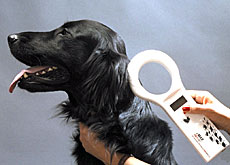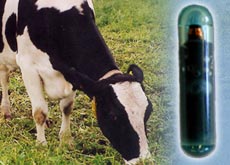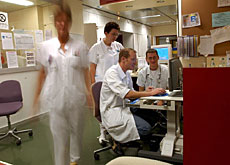Swiss company expands horizons by tagging pets

A Swiss company, Datamars, is at the forefront of electronic tagging for animals.
It hopes to boost sales when the European Union makes electronic tags for cats and dogs mandatory from the start of July.
Microchips can be used to identify dogs and trace their owners. If a dog which has been embedded with a microchip is run over by a car, for example, police can quickly identify it and contact its owner.
The swift identification is made possible by a reading device and a microchip implanted under the dog’s skin.
The chip – no larger than a grain of rice – is inserted into the dog’s neck and contains a 15-digit code which carries information on the animal’s breed, gender, name and fur colour, as well as the address of its owners.
Market potential
Electronic tagging of animals is considered to have huge market potential. An increasing number of countries have begun introducing regulations governing the tracking of dogs and other animals.
In Switzerland alone there are an estimated 450,000 dogs. Given that the cost of inserting a microchip is around SFr80 ($63), experts believe the business of tagging is potentially worth up to SFr30 million.
According to the Federal Veterinary Office, dogs in Switzerland will have to be tagged by the end of 2006.
Datamars, a company in southern Switzerland, was quick to see the potential for business. Its founder, Parvis Hassan-Zade, began specialising in the production of transponders and reading devices back in 1988.
“We began small, with only four people,” he told swissinfo.
Now the company in Bedano near Lugano employs 65 people and has annual sales of about SFr20 million. It is one of the global market leaders and has outsourced part of its production to Thailand.
Hassan-Zade, an economist who has also worked in the watchmaking industry, says it took a lot of persistence to make it through the first few years.
He says nobody believed in the technology and that it was hard to find the necessary start-up capital.
Distribution network
Datamars does not operate its own distribution network. Its transponders – which bear the stamp “manufactured by Datamars” – are sold on the market by other companies.
The Swiss pharmaceutical firm, Novartis, as well as Germany’s Bayer and the French company, Virbac, sell the product under their own names.
Datamars expects to focus its business strategy on tracing devices for animals.
Hassan-Zade is optimistic about the future of the technology, as he expects the EU to introduce mandatory electronic tagging for sheep and goats by 2008. He believes that similar measures could follow for pigs and cattle.
Hassan-Zade says it would also be technically possible to fit humans with microchips as a means of getting swift access to medical data.
“But I think we need to discuss this question from an ethical point of view,” he adds.
swissinfo, Gerhard Lob in Bedano
Datamars employs 65 people in Switzerland and 60 in Thailand.
When the company was set up in 1988 it employed just 4 people.
There are an estimated 450,000 dogs and more than one million cats in Switzerland.
Electronic tagging for cats and dogs will be compulsory in the EU from July 2004.
Tagging is mandatory for dogs in some regions of Switzerland.
A federal law is not expected to come into force before 2006.

In compliance with the JTI standards
More: SWI swissinfo.ch certified by the Journalism Trust Initiative


You can find an overview of ongoing debates with our journalists here . Please join us!
If you want to start a conversation about a topic raised in this article or want to report factual errors, email us at english@swissinfo.ch.